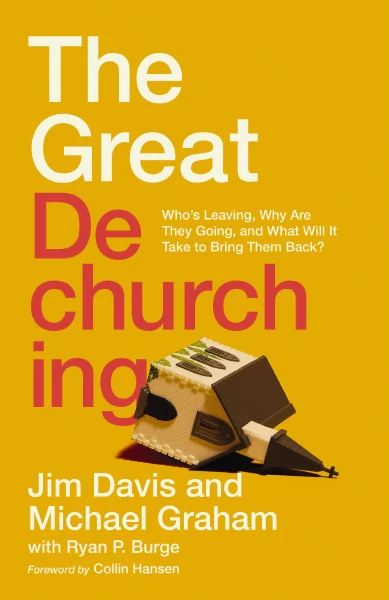
Jim Davis and Michael Graham
Reviewed by: Dave Holmlund
The Great Dechurching: Who’s Leaving, Why Are They Going, and What Will It Take to Bring Them Back?, by Jim Davis and Michael Graham. Zondervan, 2023. Hardcover, 272 pages, $20.99 (Amazon). Reviewed by OP minister Dave Holmlund.
Many of us have friends or family members who used to be members of the local church but have at some point stopped attending church. Sadly, the number of these church dropouts has been on the rise in recent years. Authors Jim Davis and Michael Graham observed this trend within their Orlando area PCA congregation several years ago, and this set them upon a project to understand both the scope of this problem across American society and what we can know about its reasons so that we might employ a missional strategy to reverse the trend.
The Great Dechurching attempts to connect professional quality statistical analysis on American church involvement with a clear pastoral concern to reach the lost sheep represented in their study. Defining a “dechurched” person as one who used to attend church at least once per month but now attends church less than once per year, they point to research indicating that around forty million American adults are in the category. The large numbers of the formerly faithful cut across all types of churches and all demographic groups. This is therefore not just an indictment of recent troubles in churches where the Bible has not always been honored—in the liberal mainline, etc. It is now an alarming pattern even in Bible-teaching evangelical churches, including Reformed churches. The book, however, mainly focuses more broadly upon dechurched evangelicals—those who were formerly a part of any evangelical church (that is, a Bible-believing Protestant congregation) and now do not attend church.
Using sophisticated computer-based tools of analysis to recognize patterns, they believe it is most helpful to think of four distinct types of evangelicals who are no longer in churches because they decided to stop attending at some point in the last two or three decades. (They also analyze a fifth group of dechurched Catholics and Mainline Protestants as a point of comparison, but this group is not as central to the study.) First, they describe “Cultural Christians” who dropped out of evangelical churches but don’t seem to show significant faith in basic Christian doctrines. Second, they point to “Dechurched Mainstream Evangelicals” who continue to believe in essential doctrines at high levels but stopped attending church—often through casually detaching after a move or a change in friendships or priorities. “Exvangelicals” are their third category, and this group is characterized by their absolute refusal to ever attend an evangelical church again. This group often reports past traumas in churches or in personal life while having more statistical correlation to broken families, broken social bonds, and mental health struggles. The fourth and last group is the “Dechurched BIPOC”—those who are Black or indigenous or persons of color. The authors present patterns in this last group which are not simply about racial identity.
For each group, Davis and Graham offer a vivid description of the experiences and attitudes behind their decisions to dechurch, but they also offer helpful thoughts on how to minister to such people for their spiritual good with hopes they might find their way back to an evangelical church. The latter chapters of the book are biblically and theologically solid presentations on ministry priorities for churches and church leaders seeking to be faithful in our modern context that contains these challenges. The chapter advocating ministry which is both “confessional” and “missional” will resonate with many Reformed Christians.
I would not call this a “must-read” book for every Christian since sociology and demographics do not appeal to all. However, I suspect many church leaders will want to read this book carefully if they have already noticed these shifts that started before the pandemic and have accelerated in the years since. Even those who are not church leaders will find it useful for understanding this cultural moment if there is a personal connection to anyone who has dechurched in recent years. For all Christians, the book highlights the distinct challenge and opportunity of carrying out the Great Commission in our modern world. May the Lord use these insights to help us understand the times and discern what biblical faithfulness entails in this newest chapter of American church mission.
July 27, 2025
July 20, 2025
July 13, 2025
Proclaiming Christ in a Pluralistic Age
July 06, 2025
June 29, 2025
June 22, 2025
June 15, 2025
© 2025 The Orthodox Presbyterian Church